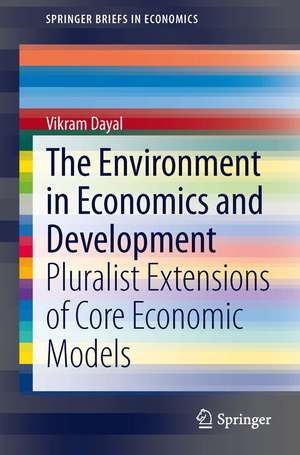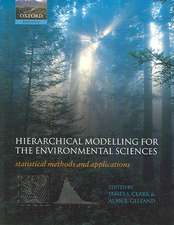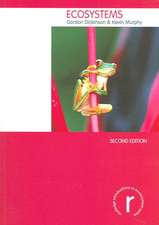The Environment in Economics and Development: Pluralist Extensions of Core Economic Models: SpringerBriefs in Economics
Autor Vikram Dayalen Limba Engleză Paperback – 4 dec 2013
Din seria SpringerBriefs in Economics
-
 Preț: 444.35 lei
Preț: 444.35 lei -
 Preț: 264.79 lei
Preț: 264.79 lei - 15%
 Preț: 462.51 lei
Preț: 462.51 lei -
 Preț: 47.33 lei
Preț: 47.33 lei -
 Preț: 353.14 lei
Preț: 353.14 lei -
 Preț: 273.32 lei
Preț: 273.32 lei -
 Preț: 376.04 lei
Preț: 376.04 lei -
 Preț: 379.09 lei
Preț: 379.09 lei -
 Preț: 380.07 lei
Preț: 380.07 lei -
 Preț: 377.35 lei
Preț: 377.35 lei -
 Preț: 379.09 lei
Preț: 379.09 lei -
 Preț: 376.59 lei
Preț: 376.59 lei -
 Preț: 408.27 lei
Preț: 408.27 lei -
 Preț: 379.09 lei
Preț: 379.09 lei -
 Preț: 383.27 lei
Preț: 383.27 lei -
 Preț: 378.54 lei
Preț: 378.54 lei -
 Preț: 377.95 lei
Preț: 377.95 lei -
 Preț: 340.23 lei
Preț: 340.23 lei -
 Preț: 380.25 lei
Preț: 380.25 lei -
 Preț: 378.12 lei
Preț: 378.12 lei -
 Preț: 376.04 lei
Preț: 376.04 lei -
 Preț: 376.04 lei
Preț: 376.04 lei -
 Preț: 379.68 lei
Preț: 379.68 lei -
 Preț: 381.00 lei
Preț: 381.00 lei -
 Preț: 375.23 lei
Preț: 375.23 lei -
 Preț: 378.54 lei
Preț: 378.54 lei -
 Preț: 377.57 lei
Preț: 377.57 lei -
 Preț: 376.04 lei
Preț: 376.04 lei -
 Preț: 378.92 lei
Preț: 378.92 lei -
 Preț: 375.62 lei
Preț: 375.62 lei -
 Preț: 379.09 lei
Preț: 379.09 lei -
 Preț: 353.67 lei
Preț: 353.67 lei -
 Preț: 342.14 lei
Preț: 342.14 lei -
 Preț: 375.45 lei
Preț: 375.45 lei -
 Preț: 379.09 lei
Preț: 379.09 lei -
 Preț: 377.35 lei
Preț: 377.35 lei -
 Preț: 344.86 lei
Preț: 344.86 lei -
 Preț: 377.35 lei
Preț: 377.35 lei -
 Preț: 345.89 lei
Preț: 345.89 lei -
 Preț: 377.57 lei
Preț: 377.57 lei -
 Preț: 343.83 lei
Preț: 343.83 lei -
 Preț: 378.12 lei
Preț: 378.12 lei -
 Preț: 345.06 lei
Preț: 345.06 lei -
 Preț: 379.48 lei
Preț: 379.48 lei -
 Preț: 379.48 lei
Preț: 379.48 lei -
 Preț: 380.07 lei
Preț: 380.07 lei -
 Preț: 375.45 lei
Preț: 375.45 lei -
 Preț: 445.33 lei
Preț: 445.33 lei -
 Preț: 378.54 lei
Preț: 378.54 lei
Preț: 376.80 lei
Nou
Puncte Express: 565
Preț estimativ în valută:
72.12€ • 75.01$ • 60.44£
72.12€ • 75.01$ • 60.44£
Carte tipărită la comandă
Livrare economică 13-27 martie
Preluare comenzi: 021 569.72.76
Specificații
ISBN-13: 9788132216704
ISBN-10: 8132216709
Pagini: 96
Ilustrații: XI, 84 p. 54 illus.
Dimensiuni: 155 x 235 x 5 mm
Greutate: 0.15 kg
Ediția:2014
Editura: Springer India
Colecția Springer
Seria SpringerBriefs in Economics
Locul publicării:New Delhi, India
ISBN-10: 8132216709
Pagini: 96
Ilustrații: XI, 84 p. 54 illus.
Dimensiuni: 155 x 235 x 5 mm
Greutate: 0.15 kg
Ediția:2014
Editura: Springer India
Colecția Springer
Seria SpringerBriefs in Economics
Locul publicării:New Delhi, India
Public țintă
ResearchCuprins
Chapter 1: Context and overview of environment and development economics.- Chapter 2: Models and frameworks.- Chapter 3: Traditional and modern pollution.- Chapter 4: Livelihoods and the Commons.- Chapter 5: Complex Ecology.- Chapter 6: Global public goods.- Chapter 7: Sustainable development and institutions.
Notă biografică
Vikram Dayal is an Associate Professor at the Institute of Economic Growth, Delhi. He has worked on a range of environmental and developmental issues: from Prosopis juliflora and tigers in Ranthambhore National Park to indoor and outdoor air pollution in Goa, India. He was exposed to these issues while a member of the Hindu College Nature Club and the student group, People’s Environment Group, where he learnt from a range of researchers and academics. His first job was at TERI (The Energy and Resources Institute), where he interacted with members of think-tanks and government officials from different sectors. He co-edited the Oxford Handbook of Environmental Economics in India with Professor Kanchan Chopra, which was published in 2009. He attended the Workshop in Political Theory and Policy Analysis in Bloomington, Indiana as a SANDEE (South Asian Network for Development and Environmental Economics) Partha Dasgupta Fellow in 2011 and is a member of the Indian Society for Ecological Economics. His current interests are in implementing methodological pluralism, dynamic ecological-economic modelling, institutional enquiry and multilevel modelling.
Textul de pe ultima copertă
This brief views the environment through diverse lenses – those of standard economics, institutional economics, political science, environmental science and ecology. Chapter 2 discusses diverse theoretical and statistical models – constrained optimization models, game theory, differential equations, and statistical models for causal inference – in a simple manner. Developing countries have certain distinct environmental problems – traditional pollution and traditional dependence on the commons. While chapters 3 and 4 discuss these specific problems, statistical graphs of the World Development Indicators explore the macro-context of developing countries in chapter 1. Chapter 5 examines ecological systems, which are nonlinear and unpredictable, and subject to sudden regime shifts. Chapter 6 deals with the global challenges of climate change and biological invasions. The last chapter discusses sustainable development and institutions. The brief explains these topics simply; mathematics islargely confined to an appendix. The broad treatment and simple exposition will appeal to students new to the field of economics. The extension of core economic models in diverse directions will also be of interest to economists looking for a different treatment of the subject.
Caracteristici
Discusses important problems in developing countries that tend to be neglected, like traditional pollution and livelihoods and the commons Covers diverse perspectives in a simple way, starting with core economic models and then drawing on institutional economics, the social and physical sciences Introduces intriguing issues such as non-linear dynamics and sudden changes in ecological systems, and points out causality issues vital to policy Includes supplementary material: sn.pub/extras













